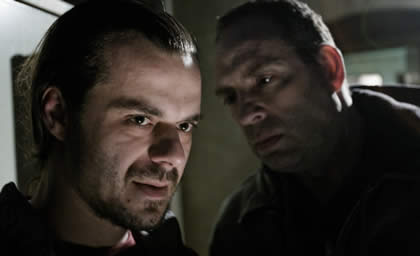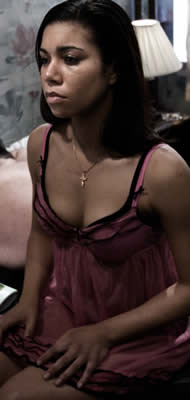Off Jackson Avenue is an interwoven crime story set in New York City involving a Mexican woman (Jessica Pimentel) who has been tricked into sex-slavery by an Albanian pimp (Stivi Paskoski) and must find a way to break out; A Japanese hit man(Jun Suenaga) who is in town to do a job for the Chinese mob and must finish his assignment despite the fact that he is haunted by his recently-dead mother’s ghost; And a local car-thief (John-Luke Montias) who must go on one last stealing spree to raise enough money to buy a tire store and go legit. A smack-bang tale of ambition, survival and fate, Off Jackson Avenue reminds us that there are still some parts of New York City that you won’t find on any map.
John-Luke Montias, director of Off Jackson Avenue, attended New York University where he studied acting and film. John-Luke shot his first film, “Bobby G Can’t Swim,” on a budget of about $20,000 in Hell’s Kitchen, New York City. The film won a number of  festival awards, including the New Directions Award and Best Director at the AFI Los Angeles International Film Festival. “Bobby G.” was released theatrically and on DVD in the US and other countries throughout the world. John-Luke later directed a TV pilot, “Nicky’s Game,” starring Burt Young and John Ventimiglia. John-Luke’s next feature will be a black comedy, “Mother’s Day”.
festival awards, including the New Directions Award and Best Director at the AFI Los Angeles International Film Festival. “Bobby G.” was released theatrically and on DVD in the US and other countries throughout the world. John-Luke later directed a TV pilot, “Nicky’s Game,” starring Burt Young and John Ventimiglia. John-Luke’s next feature will be a black comedy, “Mother’s Day”.
Bijan Tehrani: How did you encounter the story of Off Jackson Avenue?
John-Luke Montias: I wish I had a set answer, but I don’t. I don’t know why I wrote this particular story; I think that it is sort of an amalgamation or a reflection of some of the things that I had been going through prior to writing the script. I had suffered a lot of losses in my family and experienced a lot of bad things in a short period of time. I had to get these things out of me somehow, so this script is a result of those experiences. As you can see, none of the characters in the script has an easy road.
Bijan: Did you visit the locations in the film prior to shooting?
John-Luke: Fortunately not. I still know a number of guys who work in the police department and they would tell me stories about their experiences, which included raiding the kind of houses seen in the film, where many young women were held as sex slaves. These types of things happen in places that you wouldn’t expect, including Long Island, Astoria, houses in Brooklyn… its really a horrifying reality.
Bijan: Did you do any kind of research to make sure that the stories told in the film were as realistic as possible.
John-Luke: Absolutely, I did as much research as I could on the internet and so forth to learn how this whole business is run. Oftentimes these women are brought here to this country with the promise of a regular job as a waitress or administrative assistant, etc. But once they’re in the clutches of the person who is picking them up at the airport, their passports are taken, they’re often beaten violently and then forced into work. While I was working as a bartender about fifteen years ago, I knew a Russian woman who had gone through that ordeal.
 Bijan: There are many different stories woven together in this film. How did you come up with the structure of the script?
Bijan: There are many different stories woven together in this film. How did you come up with the structure of the script?
John-Luke: Originally, I started with the three main characters sitting on an airplane. The audience would be aware that the three characters have or are going to impact each other’s lives, but the characters themselves would be unaware of this. But the more that I tried to work that idea the more it seemed restrictive to place the characters on a plane. But I retained the idea of having three characters lives and stories interact with one another. I tried to place myself in each of the characters shoes and try to envision how each character was going to go about achieving his or her goal.
Bijan: How did you go about casting the film?
John-Luke: I’ve known Jun Suenaga for about ten years and I’ve always wanted to work with him, when I started writing the script I wasn’t sure how I was going to use him but I knew that I had to have him in the movie. The other characters, Olivia and Milo, were done through auditions. These were actually very difficult roles to play; Stivi Paskoski and Jessica Pimentel are both American born, so it was a challenge for them to perform with accents and to portray something that they very much are not. Casting was one of the things that I was most worried about, finding actors that could play the roles of Milo and Olivia convincingly. 
Bijan: The issue of human trafficking is becoming very important in the world today. What was the public reaction to your film?
John-Luke: It’s funny that you should mention that because, just a couple of days ago, we received a phone call from the state department. Someone who is connected there had seen our film and acknowledged that sex trafficking was an issue that they were very concerned about and that they were going to try and get behind this movie as much as possible. Now, I’m not sure if they’re going to be as interested in the other parts of the film, but it was still exciting to get a message from the state department and knowing that they are interested in doing something because human trafficking is truly a disgusting practice.
 Bijan: Did the actors mostly remain faithful to the script or were they allowed to improvise?
Bijan: Did the actors mostly remain faithful to the script or were they allowed to improvise?
John-Luke: The actors mostly stuck to the script, mainly because we had so little time and money. We also shot this movie on film, so every second that the camera was rolling was a lot of money being spent. So we had to rehearse before shooting began and also while shooting. I love the idea of improvising but with a small film like this there just wasn’t much room for it. I also firmly believe that actors are hired to act, not write. There were instances where actors would have a problem getting their minds around a certain line, I would easily change that line for them and we could figure out what was easier for them to say.
Bijan: When are you planning to have a DVD release?
John-Luke: We have a sales agent who is working on a deal right now, so hopefully the DVD will be out very shortly.
Bijan: What will be your next project?
John-Luke:The next project is a movie called Mother’s Day it’s a black comedy about a young man from Brooklyn who gets in trouble with some bad guys and has to hide out with his mother in upstate New York for a day. But his Mother has Alzheimer Disease and doesn’t remember the son immediately. Eventually the bad guys catch up and everything goes crazy. The main challenge for this film would be finding an actress in the age range of 70-80 years old who would be able to perform this role; Gena Rowlands for instance would be great for this because it would be great to see an older actress do some solid work and I feel that the audience would get a real kick out of the movie.
Bijan: Great! Thank you for your time and good luck with your next project!

